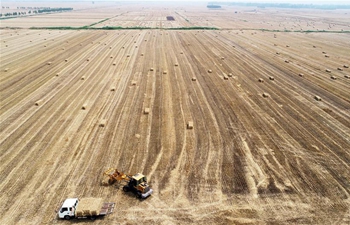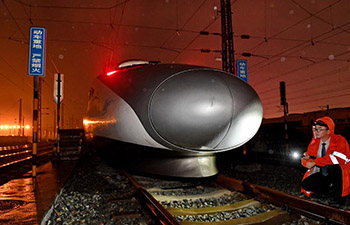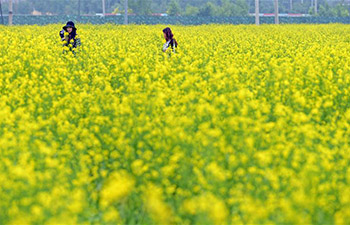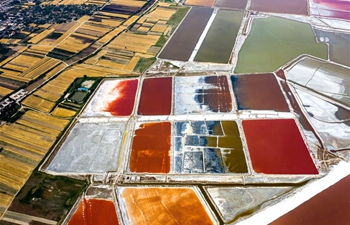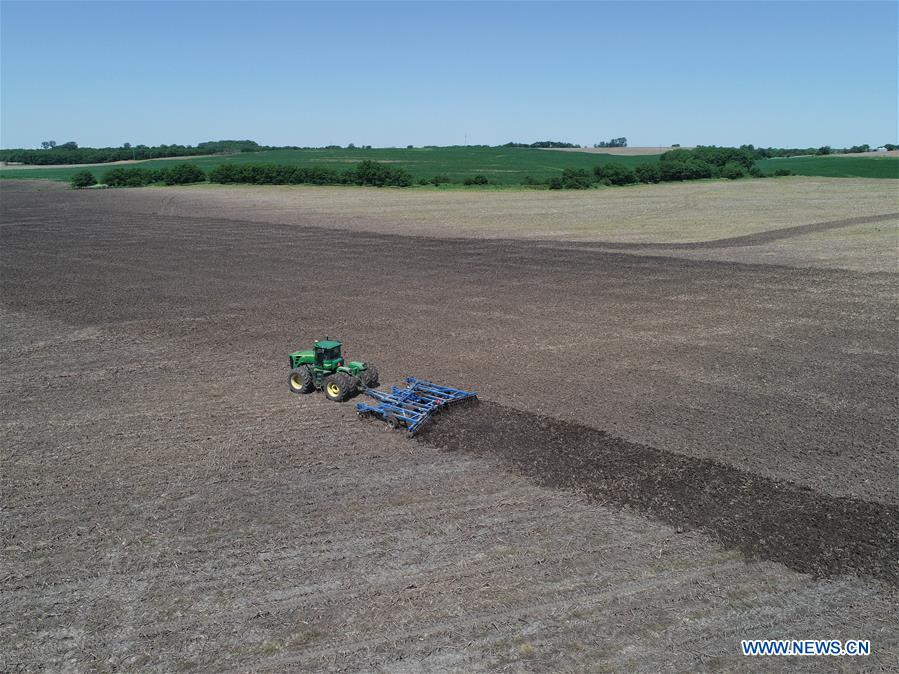
Aerial photo taken on June 10, 2019 shows Blake Hurst, president of the Missouri Farm Bureau, also a corn, soybean and greenhouse farmer, driving a tractor in his field in Tarkio, Missouri, the United States. The combined uncertainty caused by an unusually wet spring and the U.S.-initiated trade tensions with China is putting Midwestern farmers on edge, said a U.S. farm leader, who fears a recovery could drag on for months or even years.(Xinhua/Liu Jie)
by Xiong Maoling and Hu Yousong
TARKIO, the United States, June 13 (Xinhua) -- The combined uncertainty caused by an unusually wet spring and the U.S.-initiated trade tensions with China is putting Midwestern farmers on edge, said a U.S. farm leader, who fears a recovery could drag on for months or even years.
Blake Hurst, president of the Missouri Farm Bureau, told Xinhua in a recent interview that several rounds of flooding in the Midwest since late March have significantly delayed planting operations and could lower crop yields this year.
"We've had maybe four times our normal amount of rain in the last six weeks in here. And that's been the same all of the Midwest," said Hurst, also a corn, soybean and greenhouse farmer in Tarkio, Atchison County, northwest Missouri. Such a widespread flooding throughout the Midwest is the worst he can remember.
According to the latest weekly crop progress report from the U.S. Department of Agriculture, about 83 percent of the corn crop had been planted as of Sunday, well behind the 99 percent five-year average. The data also show that soybean growers had only planted 60 percent of acreage as of June 9, far below a five-year average of 88 percent.
Hurst, who has 40-plus years of farming experience, said corn should ideally be planted by the first week of May, and a one-month delay could cut the normal yield by roughly 20 percent, as there might not be enough time for it to mature before the frost hits the ground.
"It will hurt our yields a great deal," said Hurst, who is also a member of the American Farm Bureau Federation board of directors.
Hurst said some 8 to 10 million acres (about 3.2 million hectare to 4 million hectare) of corn might not be planted at all, as the rain-soaked fields might not dry out before the planting window closes. And if soybeans don't get planted by next week, farmers will start to lose yield as well.
But what concerns Hurst is more than the potentially reduced yields. After such catastrophic floods, it would take "some time" for the affected farmers to recover, he said, as they need to repair levees, restore drainage ditches, clean up debris, remove tree limbs, and deal with sand deposits, among others.
It could take the farmers up to three or four years to fully recover, Hurst said, adding that some farms won't be able to recover after "taking such a financial hit."
The financial hit is certainly compounded by the U.S.-China trade tensions, which have drained the demand for U.S. agricultural products, especially soybeans, and caused prices to plummet. "It has made a big difference to farmers' income over the several months the trade tensions have been going on," he said.
Hurst's family owns 6,000 acres (2,428 hectare) of land, usually split between corn and soybean. The farm produces 150,000 bushels of soybeans a year, but with the price drop, he said his gross income would suffer a loss of 250,000 dollars in 2019.
In Atchison County, a farming community of about 5,000 people, farmers will be looking at a decline of 10 million dollars in gross income this year, Hurst said.
Hurst believes that restoring the farming industry from the damage of trade tensions is not just a matter of time. "The question has to be, are we losing these markets permanently?" he said, adding that the U.S.-initiated trade tensions in some ways made Washington appear "not as a dependable supplier."
"I would not be surprised if our customers look elsewhere," he said. "We'll be paying for this for years."


